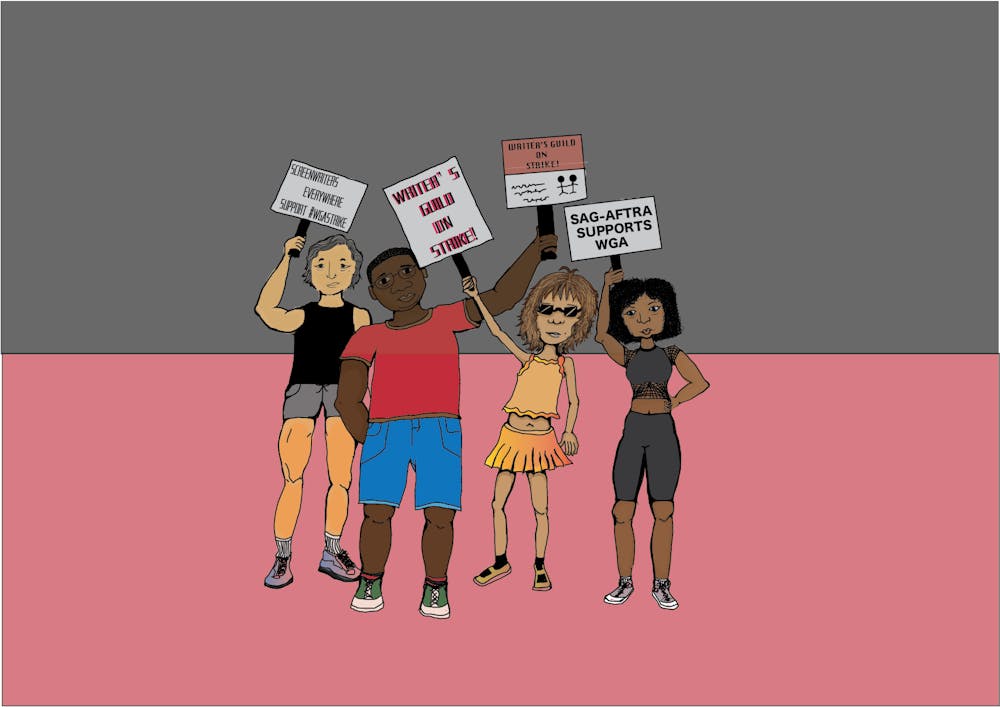On May 1, the Writers Guild of America (WGA) voted to enact a strike, which came into effect the next day. This vote followed weeks of failed attempts to negotiate a new film and scripted television contract with the Alliance of Motion Picture and Television Producers (AMPTP), including big name studios Netflix, Amazon, Apple, Disney, Discovery-Warner, NBC Universal, Paramount and Sony.
Not only that, but the Screen Actors Guild—American Federation of Television and Radio Artists (SAG-AFTRA), an organization of media professionals, voted on June 5 in favor of a strike authorization. Their negotiations began on June 7, and if the AMPTP does not give in to a fair agreement by June 30, the talented faces we see on our screens will be striking as well.
Every three years, the WGA negotiates a new basic contract with the AMPTP, leading to the most recent impasse.
The strike has persisted for seven weeks now, and many are wondering what this means for the industry. Examining the 2007-2008 writers’ strike, the timeline of negotiations since the founding of the Guild and the WGA's current demands can give us many answers about what the future holds.
Their public announcement of labor action can be found in a Deadline article published May 1.
“[The AMPTP] have closed the door on their labor force and opened the door to writing as an entirely freelance profession. No such deal could ever be contemplated by this membership,” the announcement reads. “Picketing will begin tomorrow afternoon.”
The demands coming from the WGA can be found on their contract campaign website. They include stipulations on compensation and residuals, pension plan and health fund, and professional standards and protection in the employment of writers.
There are obvious demands for more freedom given to the writers when it comes to employment contracts and equity within the workplace, as well as health resources. The largest notion of change, however, can be found in their commentary on residuals.
On an informational website provided by the Writer’s Guild, residuals are explained as compensation for the reuse of a credited writer’s work. This concept is what the Guild was initially founded on, an organization meant to ensure credits and reasonable pay. A timeline of residual changes over the years is also provided on the website.
In 1953, the Guild negotiated the first television residuals provisions. In 1960, this same concept was established for theatrical films moved to free television. In 1977, television residuals were extended to perpetuity, a large upgrade from the original five rerun payments. In 1988, following the longest strike to occur within the Guild, an increase in residuals was negotiated. After the 2007 writers’ strike, they secured jurisdiction over new media, meaning streamers would have to hire WGA writers on shows over certain budgets, setting a precedent for an era of streaming they were not aware of at the time.
Residuals remain the largest issue here. Many popular shows run on networks, and those same shows can usually be found on streaming services, such as Hulu or Max. Due to the negotiations dating back to the ‘50s, writers will be paid residuals for reruns, meaning the writers of “Friends” are still cashing checks whenever Nickelodeon televises a marathon. However, if you were to watch “Friends” on Max, they would not receive a penny.
That is where the current strike comes in. In the 2023 WGA Contract, they are specifically asking for streaming residuals, when it comes to both film and television. The streaming market has never been this influential within the industry. With many movies and shows being sent straight to streaming, it is necessary to set a precedent for any further developments that may take place.
In the past week, Disney has announced an entire overhaul of their schedule, including the decision to delay the next three “Avatar” movies by a year and a reshuffling of their Marvel release dates. This is no doubt due to the ongoing WGA strike.
As long as writers are on the picket lines, production in Hollywood is at a near a pause, and disruptions in scheduling will become more and more frequent. Writers are there through every step, rewriting scripts as filming takes place and pitching fresh ideas to studio executives. If the AMPTP remains unwilling to reach an agreement with the WGA, a SAG-AFTRA strike will follow soon after, and the industry will reach a full stop.
If you are interested in showing your support for writers fighting in favor of fair wages and equity within the workplace, visit the WGA Contract site for more information.






